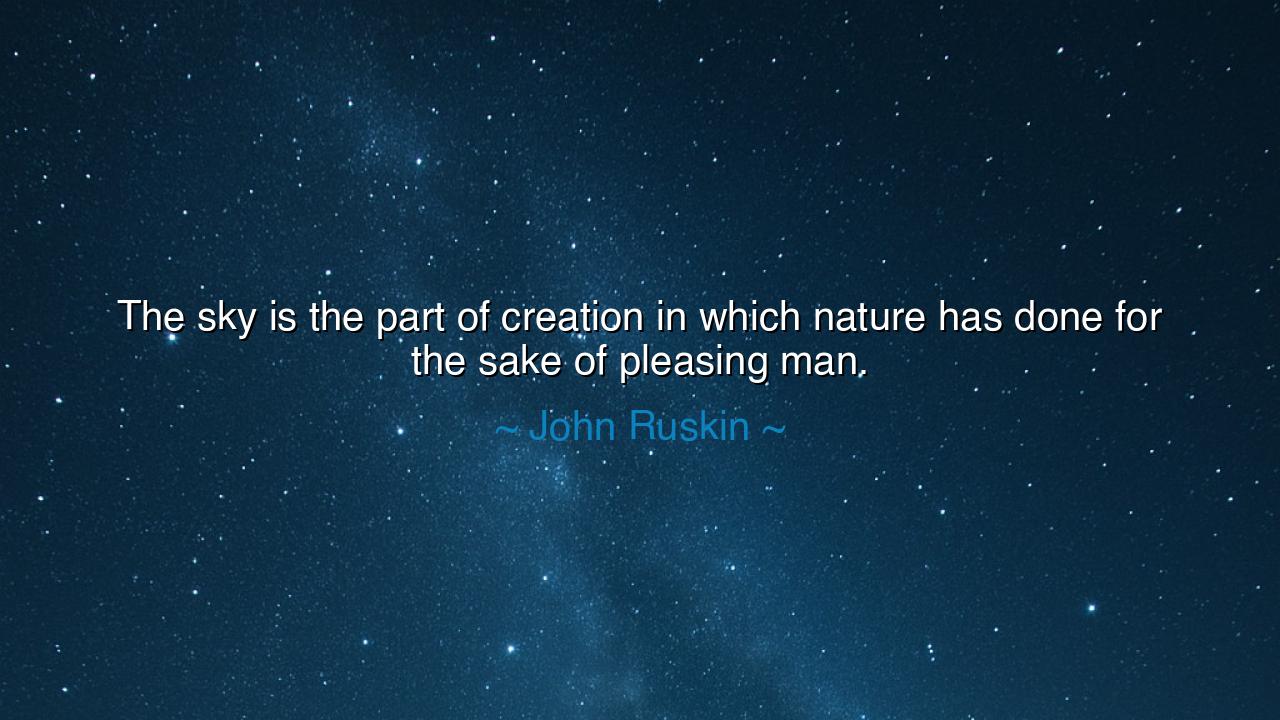
The sky is the part of creation in which nature has done for the






John Ruskin, the great critic and seer of beauty, once proclaimed: “The sky is the part of creation in which nature has done for the sake of pleasing man.” In this utterance, he touches upon a mystery that has stirred human hearts since the dawn of time. The earth beneath our feet sustains us; the seas carry us; the forests clothe and feed us. But the sky—that boundless canopy of color and light—serves no practical necessity in the same way. Its daily transformations, from dawn’s blush to dusk’s fire, seem designed not for utility but for wonder. In the sky, Ruskin says, we see nature’s pure gift, a realm crafted for beauty, for awe, and for the delight of the human soul.
The ancients often looked upward and declared the sky divine. The Babylonians charted the stars, believing they were messages from the gods. The Egyptians worshiped Nut, the goddess who arched her body across the heavens, sheltering the world. The Greeks told of Uranus, the sky-father, first of the primordial beings. In all cultures, the sky was not only a physical expanse but a spiritual stage, where meaning, prophecy, and mystery dwelled. Ruskin’s words echo this long tradition: the heavens are not mere accident, but revelation—a portion of creation meant to draw man’s gaze upward.
One can think here of the story of Vincent van Gogh, who in his torment and longing painted the heavens in “Starry Night.” He filled the sky not with passive dots of light, but with spirals, swirls, flames of celestial fire. To him, the sky was alive, speaking directly to his restless soul. Though he struggled with despair on earth, he found in the heavens a beauty that transcended pain. Van Gogh’s work is Ruskin’s thought made visible: the sky as the gift of nature, created not to serve the body but to uplift the heart.
Yet the sky also serves as a moral teacher. Its storms remind us of power beyond our control, its calms remind us of peace attainable within. At sunrise, we are taught renewal; at sunset, the dignity of endings. In the stars, we are reminded of eternity, and in the moving clouds, of change. No two days are the same, and yet the sky is always there, unbroken in its presence. It is as if nature, in her wisdom, crafted this grand pageant above to whisper to mankind: Look up. Remember. Live in awe.
But there is a deeper lesson hidden still. Ruskin’s claim that the sky was made “for the sake of pleasing man” does not mean it exists for man’s pride, but for his humility. For when we gaze upon its vastness, we are made small, and in our smallness, we find reverence. The sky does not bend to us; it commands us to lift our eyes from the dust and see something beyond ourselves. To be pleased by the heavens is not to own them, but to receive them as a child receives a gift: with wonder, gratitude, and silence.
The lesson, then, is this: do not forget to look upward. In the labor of the day, in the noise of the world, we often stare only at the ground before us. But the sky is always there, vast and generous, waiting to restore our vision. Whether it is the crimson fire of dawn, the silver clarity of noon, or the velvet star-cloth of night, let it remind you that life is more than toil. The heavens exist not only to shelter you, but to teach you joy.
Practically, this means cultivating the habit of wonder. Pause when you see a sunrise. Step outside when the storm passes and watch the clouds torn open to light. At night, stand beneath the stars and let them speak of distances that humble your heart. These small acts of attention restore the soul, for they reconnect you with the gift that Ruskin saw: a sky, painted anew each day, designed to please, to instruct, and to remind man that he walks not only upon earth but beneath eternity.
Thus, Ruskin’s words endure: “The sky is the part of creation in which nature has done for the sake of pleasing man.” Take them as both comfort and command. Do not walk with bowed head only. Lift your eyes often to the heavens, for in their shifting splendor you will find the very language of beauty, written across the firmament by the hand of the eternal.






AAdministratorAdministrator
Welcome, honored guests. Please leave a comment, we will respond soon